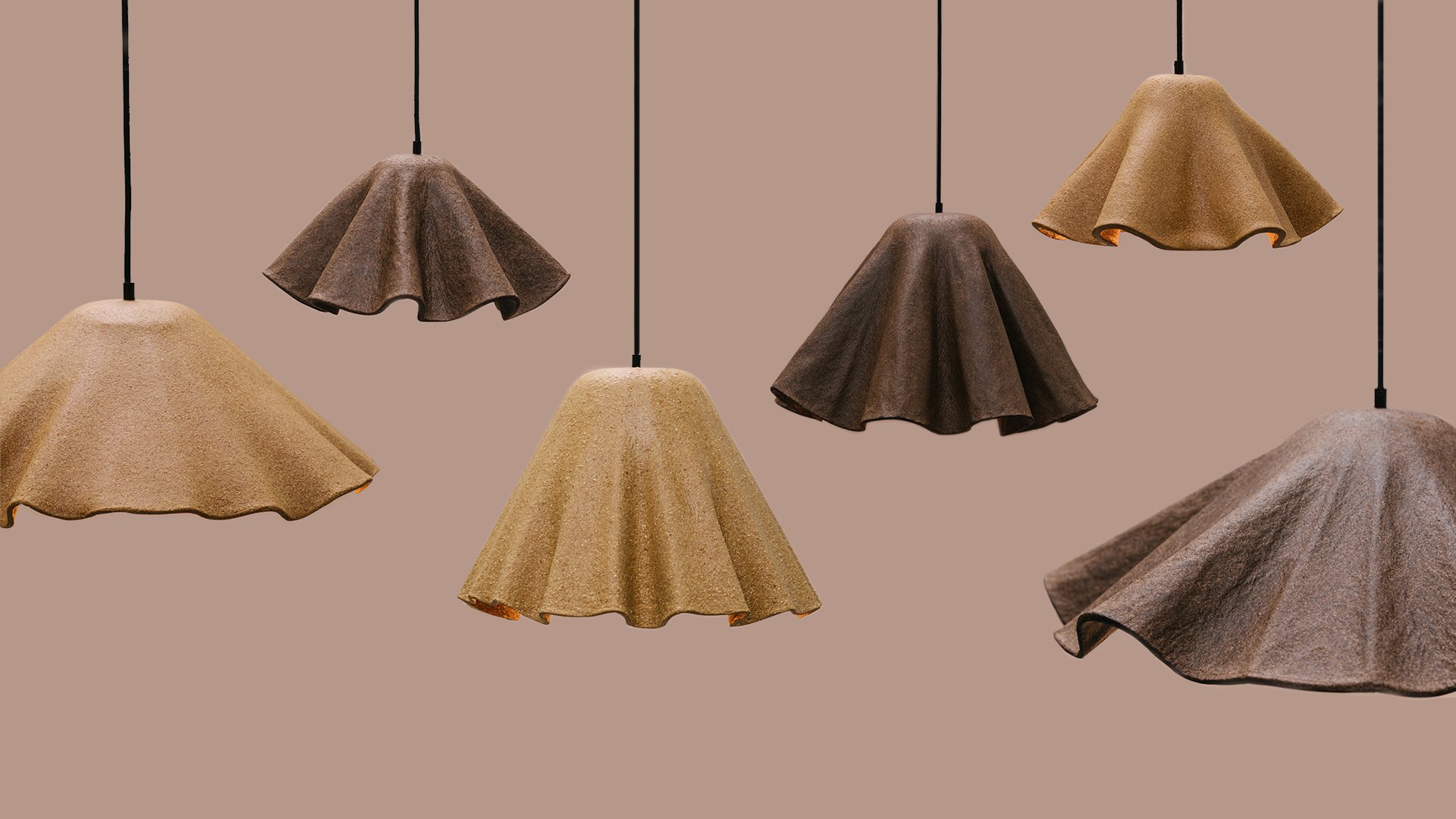OBSCURE Lampshades by Biohm
London-based biotech and biomanufacturing startup, Biohm, has launched a collection of 100% natural and beyond sustainable lampshades made from ‘waste’ coffee chaff and orange peel that would otherwise have been sent to landfill or incinerated.
The fast-growing startup has quickly become a leading pioneer in the research, development and bio-manufacturing of natural materials for the built environment made from excess resources (‘waste’) and by-products, including the mycoremediation (elimination) of plastic. Biohm’s revolutionary approach to product development addresses the world’s most pressing challenges — the climate emergency, the waste crisis, health and wellbeing and social injustice — as one. Rather than attempt to find a solution to a singular challenge, they have embraced the principles of biomimetics (systematically applying the ecological laws of nature) to create products and manufacturing approaches that innovate across the entire spectrum, enabling high performing, regenerative, ethically-sourced and locally fabricated products.
“There has never been a more critical time to be doing the work we do at Biohm. Recent events have emphasised how our economies and systems are flawed and unsustainable and that we need to immediately implement radical and regenerative biotechnologies delivered through equitable and compassionate business models to make leaps in the fight against the climate crisis.”
Ehab Sayed | Founder | Director of Innovation
The Obscure lampshades manifest the systemic approach to addressing the world’s biggest sustainability challenges with a nature-inspired solution.
The lampshades are made from one of BIOHM’s materials, Orb or organic refuse biocompound, which consists of food and agricultural by-products and a unique plant-based binder. Orb is a 100% natural, sustainable and renewable material that can be formed into sheets or moulded to create intricate three dimensional products.
Global coffee production generates more than 20 million tonnes of waste per year, whilst orange production generates approximately 5 million tonnes of waste.
Incorporating up to 3 kilograms of ‘waste’ orange peel or coffee chaff and capturing up to 1.5 kg of carbon, each lampshade acts as a mini carbon sink, diverting waste away from landfill and regenerating the environment. At end-of-life, the lampshades can be fed back into the production process of Orb to make new products, passing their carbon onto the next product or they can be cold-composted.
Obscure lampshades are lovingly hand-produced on demand at BIOHM HQ in South Bermondsey in London, UK. Biohm’s supply chain is hyper-localised and the production process is completely closed-loop, which means that there are no waste streams or by-products created as a result of this approach to production.
This product will be biomanufactured using a ‘Just-In-Time’ or ‘On-Demand’ approach to production to make sure that every Obscure lampshade is produced with a clearly defined purpose to serve. This allows us to avoid overproduction and encourage responsible and pre- planned shopping practices.
Design Concept:
Obscure lamp shades also manifest nature’s genius through an intelligent, material-driven approach to design. The collection represents the close-knit collaboration between ‘maker’ and ‘matter’.
Biohm’s design team has been developing and refining Orb for years. Building such a deep level of understanding of the material or matter that they are working with, informed the obscure design. As the makers, they have set the mathematical parameters and have created the geometric boundaries or skeleton and the rest was up to the matter. Subjected to the natural forces of gravity and confined by the maker’s geometry, the matter drapes and folds organically to obscure the intelligent skeleton that supports it in much the same way that layers of matter fall to their death on the forest floor.
Death is designed into the Obscure collection. At end-of-life, the lampshades can be fed back into the production process of Orb to make new products or they can be cold-composted. This means that these products sequester and lock carbon within them until they have lived a useful life and then they let die gracefully, passing their carbon onto the next product or, if composted, gradually gifting it to the biosphere and atmosphere over time.
Contact:
Contact: hello@biohm.co.uk
Web: https://www.biohm.co.uk/shop



